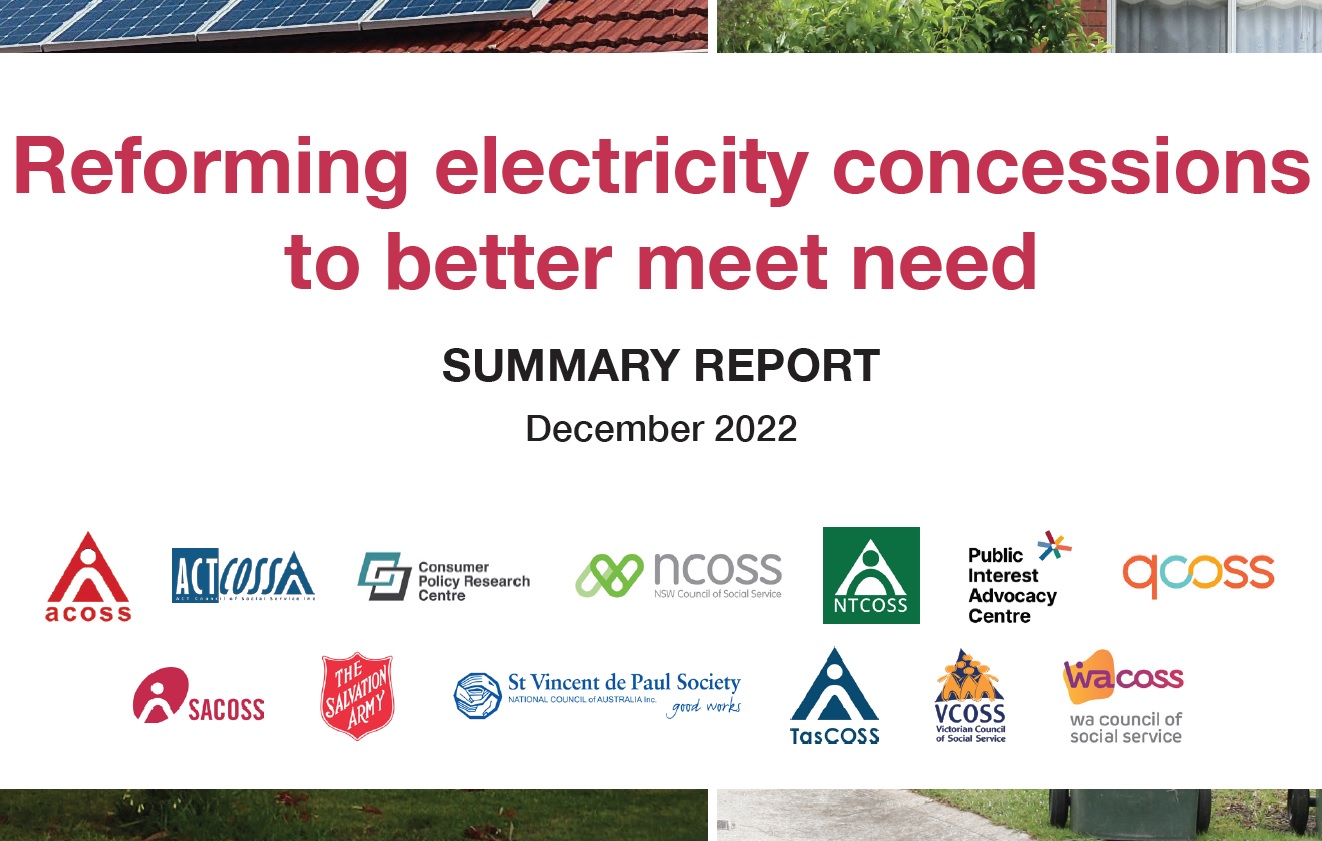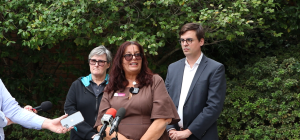A report released today by social service organisations found that while around three million households receive some form of ongoing financial assistance for their energy bills, the poor design and implementation of the assistance means too many people still can’t afford the energy they need.
Read the report: Reforming Electricity Concessions to Better Meet Need
Too many people are depriving themselves of energy taking fewer showers, cooking less, not heating or cooling their homes to reduce bills, going without food, medicine, and other essentials to pay energy bills and still finding themselves in energy debt with no way to pay debt down.
The report found that providing energy concessions and annual rebates as a fixed amount means it does not respond to energy price changes, seasonal variations in energy use, or the energy performance of the home. It also means that some people are getting more assistance than they need, and others are getting significantly less.
For example, a fixed concession of $241.63 a year would only cover 7% of the energy bill of a 4-person family in a 3-bedroom home without solar, compared to a single person 2-bedroom home with solar where the same concession covers 63% of the energy bill.
Many of these concerns raised in this report were raised by the Australian Competition and Consumer Commission (ACCC) in 2018. Its recommendations have not been acted upon.
The report recommends shifting to a percentage-based concession or rebates (such as the regime currently operating in Victoria) which will help adapt support relative to need and circumstances, changes in the energy market and technology, and help manage the risks of the energy market transition for those most in need.
The report also considers transitional arrangements and notes that investment in energy efficiency, electrification and solar for low-income homes, combined with percentage-based concession, would ultimately reduce the cost to governments as well as households.
The report recommends Energy Ministers commit to undertake energy concessions and rebate reform as relevant to their jurisdiction to improve equity, accessibility, and better meet people’s energy needs and changing circumstances. The report recommends the ACCC to model how percentage-based concessions can be implemented, and separate reviews to look at eligibility and putting in place processes such as consumer focused automation to improve access to concessions and rebates.
It also outlines complementary measures Federal, State and Territory Governments should take to support the effectiveness of energy concessions:
- immediately lift income supports above the poverty line to improve the capacity of people on low incomes to afford energy bills;
- co-invest in efficient electric appliances, thermal efficiency, and solar upgrade programs for low-income households;
- shift the costs of green schemes off bills or offset the costs for people on low incomes.
SACOSS, CEO, Ross Womersley said:
“Now is the perfect time to reform energy concessions to better meet the needs of Australian households doing it tough. Energy prices are rising, and concessions reform is vital for managing the energy transition and ensuring households are protected from energy hardship.”
“An adequate, percentage-based concession with appropriate transition measures is needed to deliver real relief to people on low incomes.”
ACOSS, CEO, Dr Cassandra Goldie said:
“At a time when people are already reducing their energy use in whatever way they can and still finding themselves in debt and unable to cover the basics like food, rent and medicine, it’s critical that Energy Ministers heed the call in this report for a new approach that better meets households’ needs.
“In addition to addressing the flaws and inequities that are preventing those most in need of financial assistance from receiving it, the Federal Government must immediately lift income supports above the poverty line so that people have enough to pay their energy bill and cover the cost of other basics like food, rent and medicine.”
WACOSS, Acting CEO, Rachel Siewert said:
“All households are different, so we need a concession system that is better able to respond to those differences and provide the assistance that is required. A percentage-based concession would best support people with their energy management over time, from changes in price to different seasonal needs.”
QCOSS, CEO, Aimee McVeigh said:
“Many Australians are struggling with soaring costs of living, including increasing energy prices. Some Queenslanders are thousands of dollars in energy debt and most low-income earners have no savings available to pay for the ever-increasing prices.
“It’s crucial that governments direct payments and support to where it is needed most, and a percentage-based concession would help ensure this.”
ACTCOSS, CEO, Dr Emma Campbell said:
“People who face disadvantage are disproportionately impacted by rising energy costs and spend a greater proportion of their incomes on energy bills. It is critical that the government review energy concessions to ensure they are sustainable, targeted and adequately respond to need.”
NCOSS, CEO, Joanna Quilty said:
“The reality is, more and more people in NSW wake up each morning and wonder how they will afford to feed their families, pay the bills, and frankly, just get by.
“What we need right now is immediate energy price relief for those really struggling and more streamlined ways for people in need to access that relief.”
TasCOSS, CEO, Adrienne Picone said:
“Thousands of Tasmanian households are missing out on the assistance they need to lower their energy bills, resulting in energy rationing, more energy debt and reduced wellbeing. A better-designed energy concession scheme will ensure necessary support to lower power bills is provided to those in need.”
Toby oConnor, CEO, St Vincent de Paul National Council of Australia, said:
“As energy costs rise, it is essential those most in need of energy assistance are helped. Percentage-based energy concessions must replace fixed amounts to ensure fairness and equity.
“Fixed amount energy concessions fail to keep up with price increases, reflect seasonal variation or the energy performance of homes. The shift to percentage-based energy concessions must be prioritised.
“Energy assistance must be fair, equitable, easy to access and adequate to meet people’s needs. Work needs to start immediately on how percentage-based energy concessions could be implemented by jurisdictions across Australia.”
Erin Turner, CEO, Consumer Policy Research Centre said:
“State and federal governments need to work together to make the system work for people on low-incomes doing it tough, rather than have consumers jump through many hoops to access their entitlements.
“The difference between utilities, different regimes and states is not easily explained – part of the problem is piecemeal reporting about consumer outcomes. Governments and regulators need to bring together better data about the concession system.”
Jonathon Hunyor, CEO, Public Interest Advocacy Centre said:
“People should not have to worry whether they can afford to use the energy they need to stay safe and healthy. Governments have long recognised this, providing rebates and concessions to support people’s energy needs.
This report makes clear that reform is needed to ensure those rebates reach the people who need them and more equitably provide the support required.
The energy system transition will involve important investments and increasing volatility in the short term, we need concessions and rebates capable of adapting to those circumstances to ensure those most vulnerable aren’t left further behind.”
Michelle Jackson TAS
“I’m in a housing commission house – gas hot water and heating, it was cheap to start with – but now that the price of gas is really expensive.
“My first gas bill was $500 for 3 months – I couldn’t pay the bill, so I joined this ‘yes’ program – they set it up so I would pay $100/fortnight to cover both gas and electricity– I don’t even see the bills but they keep adding up.
“We don’t have a choice of electricity – it’s all from the Hydro Electric Commission, and there’s no support for people who want to put solar panels on their roof.
“When you’re out of work you’re home for a lot of the day, so you run your heating and cooling more to make it bearable.
“I only have air-conditioning in the main lounge area. So when it heats up to 35 degrees there’s no relief in the bedrooms except for electric standing fans – we have those going at night, but they don’t help much.
“To save energy I don’t cook as much – I do my washing late at night when it’s cheaper, I’ll be out at midnight hanging my washing. We only have short showers and never use the bath because it costs too much to heat the water.
“I asked Housing Tasmania for years can I get a heat pump instead of gas hot water heating but they said no – until just a few months ago they replaced the gas hot water with an electric heat pump. That’s having some impact on reducing my bills. It’s gone down from owing $1283 down to just over $900 – but paying $100/fortnight I still can’t see how I will ever pay it off.
“It’s so demoralising, you don’t even feel like a human. You don’t feel like you’re part of the rest of society and that people don’t really give a damn.
“I feel worthless, I feel like life can only get worse, I feel suicidal at times.
Jennifer and Mark Goodrick QLD
“Poor housing is a big issue with energy costs – our last rental was more like a glorified tent.
“We were always either too hot in summer and too cold in winter, even with the heater or the cooler on. The house just leaked energy.
“The windows didn’t fit properly, and you could see through the floorboards. All the doors to the outside had a 1andhalf inch gap underneath them so drafts and all sorts of things got in.
“We used to turn the electric hot water off at the mains, and just turn it on half an hour before we wanted a hot shower, to save costs.
“Our bill was over $500 a quarter.
“Our current social housing home is much better designed and built; the temperature stays pretty constant inside.
“The outside windows have covers to stop the sun getting in and other heat minimising features.
“The walls are very thick; the glass doors and windows are heavily glazed. All the doors are properly sealed, so there are no draughts.
“Because of all that our bill is half what it used to be about $240/quarter.
“The only thing that would make this even better is if we could get solar panels up on the roof.”
Media Contacts:
ACOSS, media contact, 0419 626 155
SACOSS, Ross Womersley, CEO, 0418805426.
QCOSS, media advisor, 0481 854 101
WACOSS, Tim Oliver, media advisor 0431 9696 25
ACTCOSS, Dr Emma Campbell, CEO, 0424 910 617
TASCOSS, Lucdina Szczypior, media advisor, 0438 280 486
NCOSS, Nick Trainor, media advisor, 0407 078 138
St Vincent de Paul, Phillip Adams; media advisor, 02 6202 1230
CPRC, media contact, 0402 684 225.
PIAC, Dan Buhagiar, Media and Communications Manager, 0478 739 280




